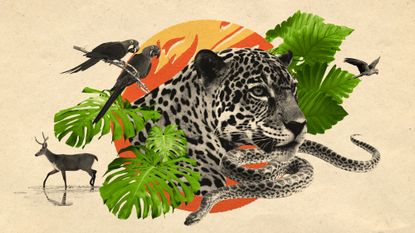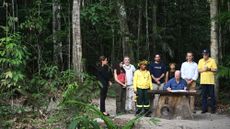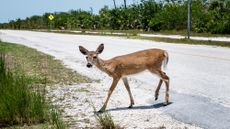The world's largest tropical wetland is on fire, and under threat from waterway
Proposed shipping route through Pantanal in Brazil could dry out biome and worsen devastating wildfires

The world's largest tropical wetland is under threat, with scientists warning that devastating wildfires and a proposed commercial waterway could spell the "end of an entire biome".
The Pantanal, which sprawls across Brazil into Bolivia and Paraguay, is bigger than England at more than 42 million acres. It's one of the world's most biologically rich environments and "a real paradise on Earth", according to ecologist Karl M Wantzen of the University of Tours, and the Unesco chair for river culture.
"Nowhere else will you see so many hyacinth macaws, jaguars, swamp deer, anacondas, caymans, more than 300 fish species, 500 bird species, 2,500 species of water plants," he told The Guardian. "All of that is at risk."
Subscribe to The Week
Escape your echo chamber. Get the facts behind the news, plus analysis from multiple perspectives.

Sign up for The Week's Free Newsletters
From our morning news briefing to a weekly Good News Newsletter, get the best of The Week delivered directly to your inbox.
From our morning news briefing to a weekly Good News Newsletter, get the best of The Week delivered directly to your inbox.
Record wildfires: 'cause for alarm'
The Pantanal is "more intact and pristine" than most other wetlands in the world, said World Wildlife. It comprises about 3% of all the wetlands on Earth – but less than 5% of it is protected. Most of the land is privately owned, mostly for cattle grazing.
This year, the Pantanal has been ravaged by record wildfires. More than 1.3 million hectares are believed to have burned – nearly half the size of Belgium. Climate experts say wildfire season started a month earlier than usual and was "more intense", thanks to high winds, heat and low rainfall, according to the BBC.
In June alone, 1,434 fires were recorded during the first 18 days of the month – much higher than in June 2020, a year of catastrophic fires during which nearly a third of the Pantanal burned. That's a 980% year-on-year increase, according to data from Brazil's National Institute for Space Research (INPE).
And it's "cause for alarm", said the Copernicus Atmosphere Monitoring Service, because wildfire season in Brazil typically "peaks" in August and September.
This year also saw the hottest, driest and windiest June on record, according to a study published this week by the World Weather Attribution service.
Human-caused climate change made the conditions that drove the blazes about 40% more intense and four to five times more likely, the analysis found. The Pantanal has also lost about 80% of its surface water since 1985, more than any other Brazilian biome.
Waterway could spell 'end of the Pantanal as we know it'
The growth of industrial soya bean farming has driven demand for a waterway, to transport goods from production areas in central South America to seaports in Uruguay and Argentina, said The Guardian.
To meet that demand, the Brazilian government is planning to develop nearly 500 miles of the Paraguay River into the Hidrovia Paraguay-Paraná (HPP) waterway.
The proposed development, as well as the expansion of industrial farming and the ongoing climate crisis, represent an "existential threat to the ecosystem", a cohort of 40 scientists warned in a paper published in the journal Science of the Total Environment.
The dredging necessary to make the river navigable by barge would further reduce the floodplain, which would increase the risk of fires. "If the hidrovia project goes ahead, navigation of large train barges in the Pantanal, with dredging in critical reaches of the Paraguay River, will probably mean the end of the Pantanal as we know it," said Pierre Girard, one of the study scientists, from the Federal University of Mato Grosso and Pantanal Research Center.
Dredging would cause "severe degradation of the globally outstanding biological and cultural diversity", said the paper, and threaten the livelihoods of the roughly three million indigenous people who live in and depend on the wetlands.
"I really want the world to know what's happening," said Wantzen, the paper's lead author. "I wanted to gather people to spell out what the current situation is. It would be a senseless tragedy."
Sign up for Today's Best Articles in your inbox
A free daily email with the biggest news stories of the day – and the best features from TheWeek.com
Harriet Marsden is a writer for The Week, mostly covering UK and global news and politics. Before joining the site, she was a freelance journalist for seven years, specialising in social affairs, gender equality and culture. She worked for The Guardian, The Times and The Independent, and regularly contributed articles to The Sunday Times, The Telegraph, The New Statesman, Tortoise Media and Metro, as well as appearing on BBC Radio London, Times Radio and “Woman’s Hour”. She has a master’s in international journalism from City University, London, and was awarded the "journalist-at-large" fellowship by the Local Trust charity in 2021.
-
 What are Trump's plans for the climate?
What are Trump's plans for the climate?Today's big question Trump's America may be a lot less green
By Devika Rao, The Week US Published
-
 Oysters from New York's past could shore up its future
Oysters from New York's past could shore up its futureUnder the Radar Project aims to seed a billion oysters in the city's waterways to improve water quality, fight coastal erosion and protect against storm surges
By Harriet Marsden, The Week UK Published
-
 The bacterial consequences of hurricanes
The bacterial consequences of hurricanesUnder the radar Floodwaters are microbial hotbeds
By Devika Rao, The Week US Published
-
 Biden visits Amazon, says climate legacy irreversible
Biden visits Amazon, says climate legacy irreversibleSpeed Read Nobody can reverse America's 'clean energy revolution,' said the president, despite the incoming Trump administration's promises to dismantle climate policies
By Peter Weber, The Week US Published
-
 Climate change is threatening Florida's Key deer
Climate change is threatening Florida's Key deerThe Explainer Questions remain as to how much effort should be put into saving the animals
By Justin Klawans, The Week US Published
-
 Ecuador's cloud forest has legal rights – and maybe a song credit
Ecuador's cloud forest has legal rights – and maybe a song creditUnder the Radar In a world first, 'rights of nature' project petitions copyright office to recognise Los Cedros forest as song co-creator
By Harriet Marsden, The Week UK Published
-
 The fight for fungi
The fight for fungiUnder the Radar The UK and Chile leading push for fungi to be placed on the same level as flora and fauna in global conservation efforts
By Chas Newkey-Burden, The Week UK Published
-
 A human foot found on Mount Everest is renewing the peak's biggest mystery
A human foot found on Mount Everest is renewing the peak's biggest mysteryUnder the radar The discovery is reviving questions about who may have summited the mountain first
By Justin Klawans, The Week US Published

